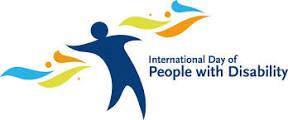
Background notes
http://www.un.org/disabilities/default.asp?id=1637#background
The International Day of Persons with Disabilities (IDPD) has been commemorated since 1992 to promote awareness and mobilize support for critical issues relating to the inclusion of persons with disabilities in society and development. The Day works to promote action to raise awareness about disability issues and draw attention to the benefits of an inclusive and accessible society for all.
Governments, UN agencies, civil society organizations, academic institutions and the private sector are encouraged to partner with organizations of persons with disabilities to arrange events and activities to commemorate the Day.
Theme for 2015: Inclusion matters: access and empowerment for people of all abilities
The estimated one billion people living with disabilities worldwide face many barriers to inclusion in many key aspects of society. As a result, people with disabilities do not enjoy access to society on an equal basis with others, which includes areas of transportation, employment, and education as well as social and political participation. The right to participate in public life is essential to create stable democracies, active citizenship and reduce inequalities in society.
 Persons with disabilities must be able to fulfil their role in society and participate on an equal basis with others. It is important to focus on the ability and not on the disability of an individual. Often, the societal image of persons with disabilities is impacted by attitudes based on stigma and discrimination, as well as archaic ideas about disability and persons with disabilities that are often the greatest barrier to their full and equal participation in society and development on an equal basis with others. It is important to note that disability is part of the human condition, and that all of us either are or will become disabled to one degree or another during the course of our lives.
Persons with disabilities must be able to fulfil their role in society and participate on an equal basis with others. It is important to focus on the ability and not on the disability of an individual. Often, the societal image of persons with disabilities is impacted by attitudes based on stigma and discrimination, as well as archaic ideas about disability and persons with disabilities that are often the greatest barrier to their full and equal participation in society and development on an equal basis with others. It is important to note that disability is part of the human condition, and that all of us either are or will become disabled to one degree or another during the course of our lives.
By promoting empowerment, real opportunities for people are created. This enhances their own capacities and supports them in setting their own priorities. Empowerment involves investing in people - in jobs, health, nutrition, education, and social protection. When people are empowered they are better prepared to take advantage of opportunities, they become agents of change and can more readily embrace their civic responsibilities.
Sub-themes for IDPD 2015:
- Making cities inclusive and accessible for all
- Improving disability data and statistics
- Including persons with invisible disabilities in society and development
Making cities inclusive and accessible for all
It is estimated that by 2050, 66% of the world’s population will be living in cities. The United Nations’ Third Global Conference on Housing and Sustainable Development - Habitat III - will take place in 2016 to review the progress, experience and lessons learnt in the past and to design a “New Urban Agenda”. This Agenda of focused policies and strategies is hoped to harness the power and forces behind urbanization. Habitat III will provide an important platform for the world’s urban development policy-makers and practitioners, as well as those working in the field of disability to review current practices and identify opportunities for change.
Importantly, the New Urban Agenda must ensure that future cities, towns and basic urban infrastructures and services are more environmentally accessible, user-friendly and inclusive of all people’s needs, including persons with disabilities. The International Day will be used to discuss and present some best practices of inclusive urbanization.










Add new comment